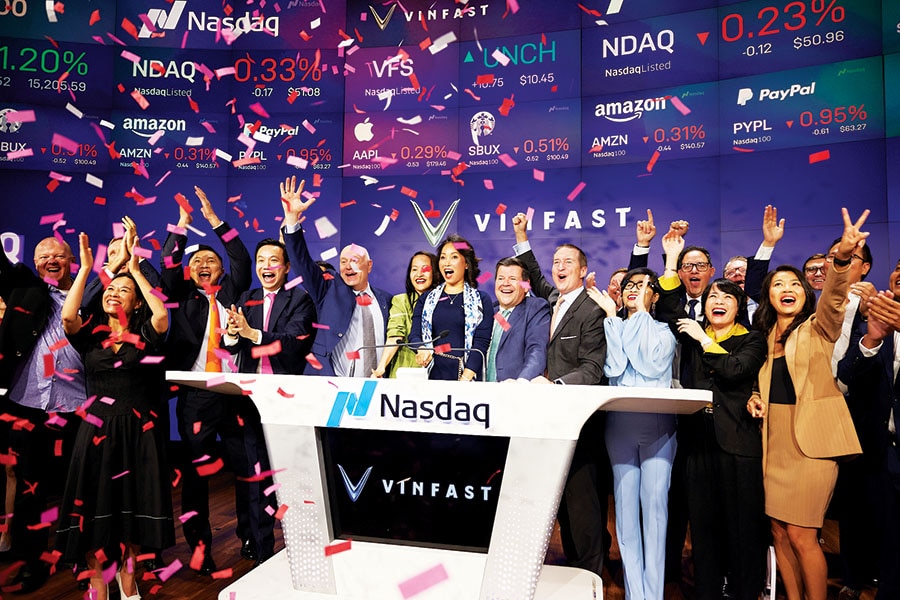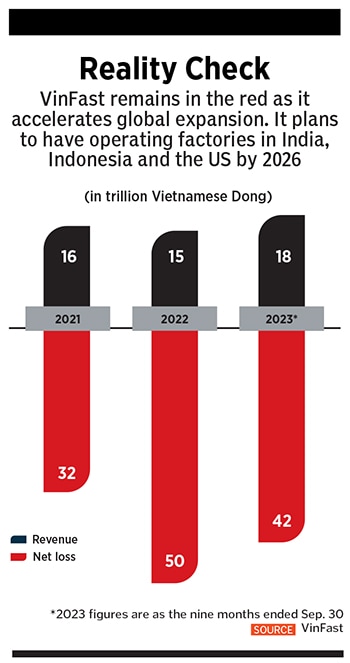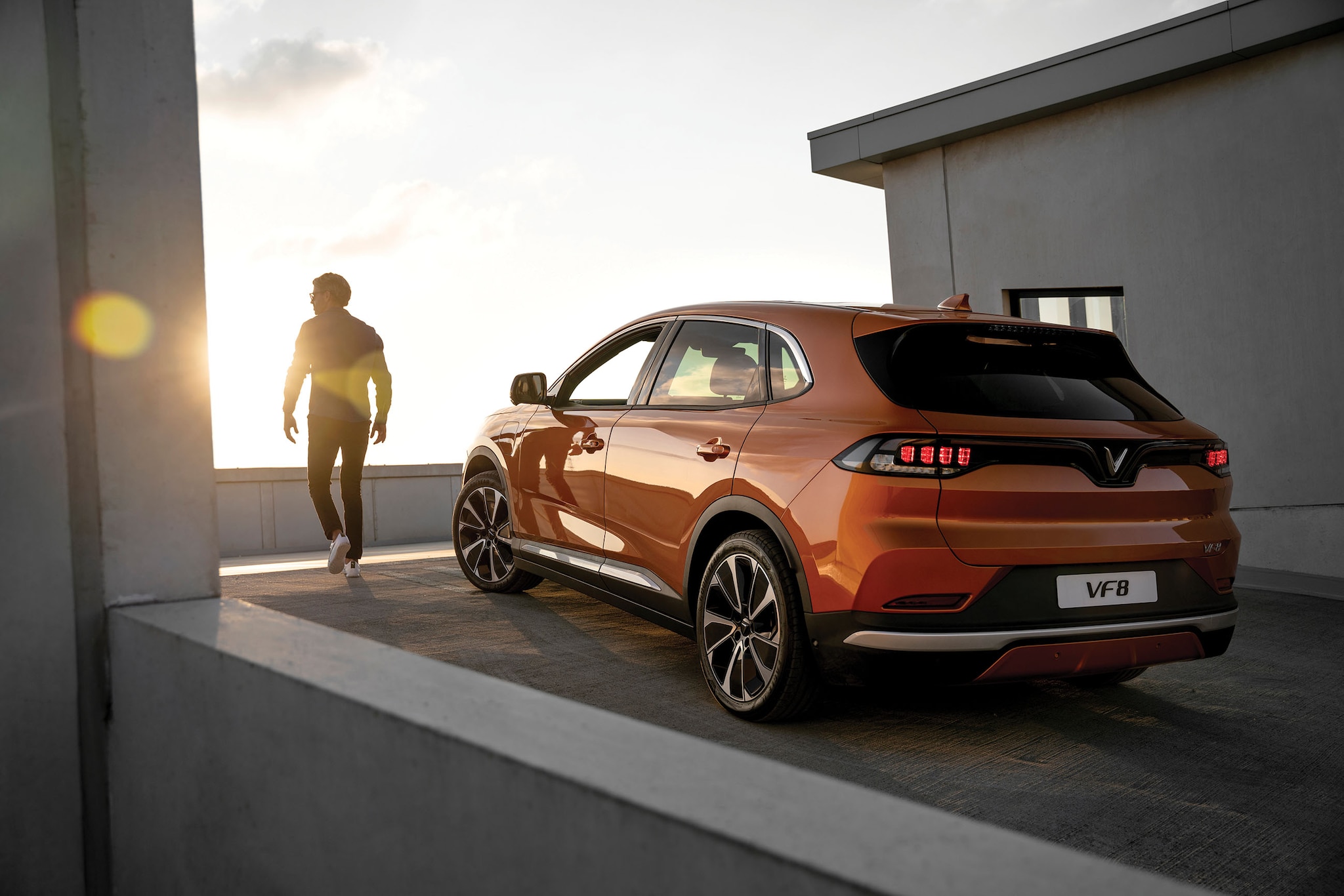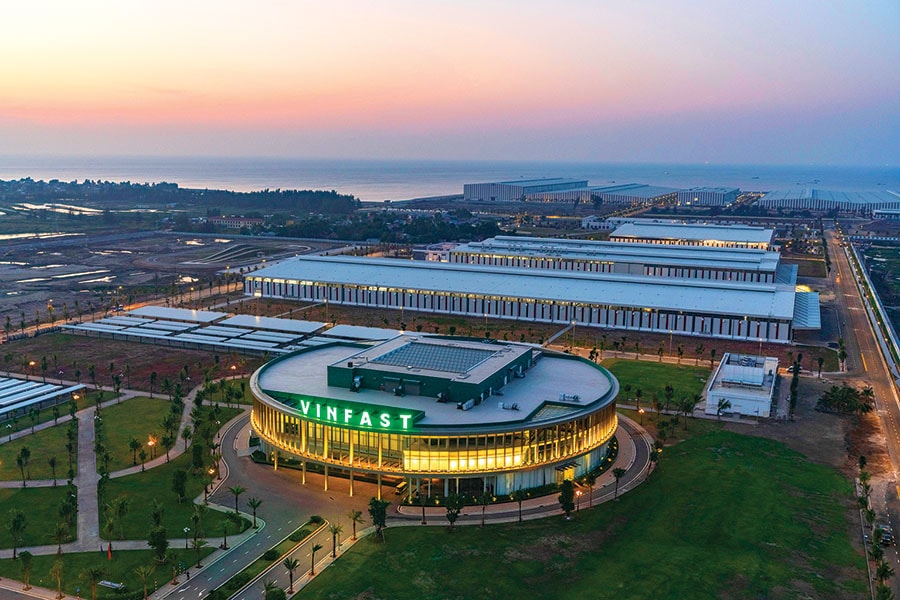Pham Nhat Vuong's electric ambitions for VinFast
Vietnam's richest person, Pham Nhat Vuong, is investing over $10 billion to turn his EV maker VinFast into a global brand—while facing major challenges in its US market entry


His current venture is to create Vietnam’s first global automaker, VinFast Auto, and he’s betting over $10 billion to make the company into a viable brand in the global electric vehicle market. But its journey so far has been bumpy, and there’s skepticism about whether it can compete outside its home country. Still, VinFast’s CEO, a former banker, is full of confidence. “Our mission is to make EVs accessible to everyone," says Le Thi Thu Thuy, 49.
VinFast has aggressive targets, including selling 1 million EVs worldwide within six years. (It took Tesla 17 years.) After investing almost $10 billion to roll out several EV models, develop a charging infrastructure and build a fully automated factory in Vietnam, the company plans to invest a further $1.8 billion in the next three years to get factories running in the US by 2025, and Indonesia and India in 2026. Of that total, $1.4 billion is going into the first phase of a North Carolina plant under construction. The goal is to take advantage of government subsidies and tax benefits in these locations and increase the group’s annual production capacity to about 550,000 units by 2026 from 300,000, the current capacity of its sole factory in Vietnam.
VinFast currently is a tiny player in the massive US market. According to automotive industry site Mark Lines, in 2023’s first nine months, the company sold merely 2,000 EVs in America. In total, the Vietnamese manufacturer says it delivered about 21,000 EVs in the first three quarters, but roughly 13,000, or more than 60 percent, stayed home for use by Green and Smart Mobility (GSM), an electric taxi company owned by Pham and his flagship company Vingroup. It says GSM ordered 30,000 EVs for the rollout of an electric taxi service across Vietnam, which is being expanded to Laos, then to Cambodia. GSM says it is mulling an entry into the US taxi market.
Sales to the group affiliate are indicative of sluggish demand, Fathima Shifara Samsudeen, Colombo-based analyst at LightStream Research, said in a note published in September on research platform SmartKarma. Separately, in an email, she says the company “will struggle to sell its EV models in the global markets". In the US, sales of the midsize SUV dubbed VF 8, the first and only model available, were hurt by an embarrassing recall in May—two months after sales began.
VinFast says it voluntarily recalled vehicles to fix a software glitch after the US National Highway Traffic Safety Administration warned the flaw blocked safety information and “may increase the risk of a crash". Thuy says the company used the market feedback to help it fix the vehicles. “We have released software updates that provide important enhancements," says Thuy by email.
 Le Thi Thu Thuy, CEO, VinFastImage: Juliana Tan for Forbes India
Le Thi Thu Thuy, CEO, VinFastImage: Juliana Tan for Forbes India
The car was said at the time to have poor ride quality and issues with its airconditioning, blind-spot monitor, GPS, turn signals and brakes. Addressing such criticisms, Thuy says: “The car may not have been designed to be tested under special conditions and behaviour, which did not satisfy some drivers, but we quickly added the requested enhancements." In a press release from late October, the company said: “In the past few months, this pioneering company has introduced a host of improvements to its VF 8 electric SUV designed to enhance the driving experience for customers."
Thuy remains undaunted, affirming that VinFast can achieve its target of delivering as many as 50,000 EVs this year with sales expected to accelerate in the fourth quarter, which she considers the peak period. “We have several models ready to be launched globally in a couple of months," she says. And VinFast plans to start selling the VF 8 in France, Germany and the Netherlands by the end of this year. It will also start shipping its seven-seater SUVs, dubbed VF 9, as well as a compact SUV, VF 6, to North America.

David Byrne, a Hong Kong-based analyst at research firm Third Bridge, says it will take time for VinFast to gain traction in North America and Europe due to the reputational issues following the US launch of VF 8 this year. “They need to get things right off the block if they’re going to be selling a decent number of vehicles," Byrne says. “It takes a long time to gain traction even if they do everything well."
VinFast cars do get praise for their looks, thanks to Italian designer Pininfarina, which helped create iconic sports cars such as the Ferrari 458 Spider. But VinFast’s EVs are not competitively priced, Byrne says. The starting price for the VF 8 is $46,000, which is similar in price to a Tesla model Y, a Ford Mustang Mach E or a Hyundai Ioniq 6. With a range of 425 kilometers on a full charge, the VF 8 falls below the claimed range of the three comparable models, all boasting full ranges of at least 482 kilometers or more. “Our vehicle pricing is not higher than competitors," Thuy says. “The prices already include cutting-edge technology features." For instance, VinFast cars are equipped with an advanced driver assistance system, which guides drivers when changing lanes and helps autonomously park the car.
 VinFast rang the opening bell on its Nasdaq debut on August 15
VinFast rang the opening bell on its Nasdaq debut on August 15
In Byrne’s view, VinFast could have gained more traction in the US if the company tapped more local industry knowledge. “They have hired foreign experts but they don’t necessarily listen to these experts," he says. Thuy says VinFast is not dependent on any single individual. “VinFast is a startup company," she says. “This requires deployment capability and speed that not everyone can adapt to. We regularly refine our organisational structure to ensure operational efficiency."
While VinFast recruited industry veterans when the company started, some didn’t stay for long, according to their LinkedIn profiles. For instance, Michael Lohscheller, former CEO of Opel who had over two decades of industry experience, joined VinFast in September 2021 as global CEO and left six months later. He was succeeded by Thuy. Lohscheller didn’t reply to emails requesting comment.
Another executive, Jeremy Snyder (who held several key positions at Tesla over 10 years) was hired as chief growth officer in May 2020 to lead VinFast’s push in the US but left in December 2021 before its first EVs reached there. In Snyder’s view, “VinFast has done some things very well. Their manufacturing facility is state of the art. They learn very quickly and adapt very quickly. There’s really an opportunity for the company to surprise people in a positive way."
 While he believes VinFast can be a global brand, Snyder says he decided to leave after fewer than two years once the strategy and leadership structure had been put in place. He sums up the challenge for VinFast this way: “If you’re building an SUV and it’s not better than a Tesla in every single way or significantly cheaper, the consumer is going to buy a Tesla."
While he believes VinFast can be a global brand, Snyder says he decided to leave after fewer than two years once the strategy and leadership structure had been put in place. He sums up the challenge for VinFast this way: “If you’re building an SUV and it’s not better than a Tesla in every single way or significantly cheaper, the consumer is going to buy a Tesla."
Despite the challenges, Pham is pushing forward with funding VinFast’s growth, and has been bankrolling much of its expansion. In April, he and Vingroup committed to invest a further $2.5 billion into VinFast and in October, VinFast merged with VinES Energy Solutions to become self-sufficient in batteries, now imported primarily from China.
Another fund-raising exercise that raised eyebrows was the early trading days of VinFast after its listing on Nasdaq on August 15. Done through a merger with a special purpose acquisition company (SPAC) backed by Hong Kong-based casino mogul Lawrence Ho, VinFast was valued at $23 billion. Then on no fresh news about the company, which has a tiny free float of less than 1 percent, the stock inexplicably skyrocketed to a peak market cap of $190 billion on August 28. Then the stock fell off a cliff, plunging over 90 percent from its peak to a market cap of $13 billion in late October—and for now the stock appears to have stabilised.
Also listen: VinFast to invest $2 billion to set up an integrated EV manufacturing hub in India
Thuy appears nonplussed about the stock’s wild gyrations. She calls the listing “a significant milestone in our global expansion and a powerful vote of confidence in our vision." And she adds: “The listing gives us access to international capital markets." Last month VinFast announced plans to sell about 76 million shares. It also signed a standby equity subscription agreement to sell as much as $1 billion of the company’s shares over the next three years to Yorkville Advisors, a hedge fund based in New Jersey.
To be sure, VinFast has yet to turn a profit since its founding in 2017. (It took Tesla 17 years to become profitable). Even as revenue in the third quarter rose more than 2.5 times to 8.25 trillion dong ($337 million), losses widened 34 percent to 15 trillion dong, thanks to high costs for global expansion. Pham, 55, has said he expects VinFast to break even this year and be profitable by 2025—and doesn’t seem fazed by how costly it is becoming to make VinFast a global brand. Pham declined to comment for this article.
 VinFast’s VF 8 electric vehicle comes with advanced driver assistance features that include autonomous parking
VinFast’s VF 8 electric vehicle comes with advanced driver assistance features that include autonomous parking
His background is in entrepreneurship rather than automaking. After winning a scholarship and earning a degree in the economics of raw material extraction from the Moscow Geological Prospecting Institute, Pham started a Vietnamese restaurant in Ukraine, which failed. But then a gamble taken in 1993 on selling instant noodles there paid off handsomely. He sold that business to Nestle in 2010 for an estimated $150 million, and put the proceeds to his first foray back home: The luxury Vinpearl resort on Nha Trang island. In 2017, he established VinFast to make internal combustion engine (ICE) vehicles, and a year later, ventured into smartphones, launching VinSmart. That was abandoned in 2021 to concentrate on EVs, though the technology developed for smartphones became VinFast EV screens, which control many of the car’s functions. In 2022, the company stopped making ICE vehicles to focus 100 percent on EVs. “Electrification is an irreversible trend worldwide," Thuy says. “VinFast cannot be left out of this global movement."
Along the way, Pham also built a commercial tower in Hanoi and a three-kilometer cable car connecting Nha Trang island with the mainland. Today, Pham has turned Vingroup into one of Vietnam’s largest business groups with interests in education, healthcare, real estate and technology.
 VinFast’s manufacturing facility in Hai Phong, Vietnam, has a capacity of 300,000
VinFast’s manufacturing facility in Hai Phong, Vietnam, has a capacity of 300,000
Thuy joined Vingroup in 2008, initially as chief financial officer, after eight years working at Lehman Brothers in various roles and getting an MBA from the International University of Japan. She later became CEO of Vingroup and then its vice chairwoman. In 2017, Pham asked her to become chairwoman of VinFast and then its CEO in 2021.
Brian Dobson, an analyst at New York-based Chardan Research, believes VinFast can carve a niche in the global market. “The mass transition to EV represents a land rush in mature auto markets not seen since the 1970s oil crisis," he wrote in October. “During this period of shifting consumer tastes, established markets are open to new entrants." According to Chardan, EV shipments to the US, Canada, Europe and Vietnam will likely surge to 10.8 million by 2028 from just 2.1 million in 2022.
Notwithstanding the bumps in its global expansion drive, VinFast remains focused on becoming a significant player in the nascent EV industry. “There’s a huge potential in front of us," Thuy says. “If we can materialise that enormous opportunity, then we can be really big."
First Published: Feb 15, 2024, 12:13
Subscribe Now